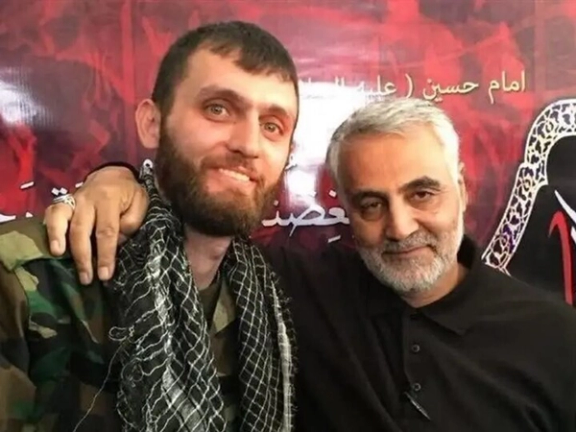Israeli academic released from militia custody in Iraq, Trump says
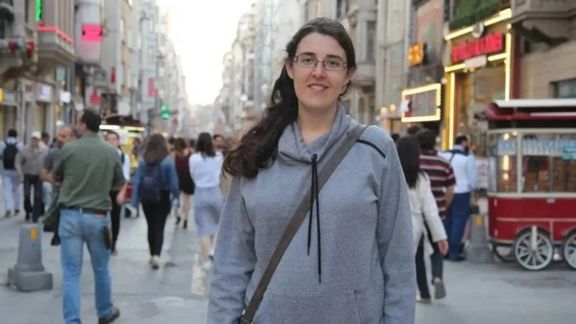
An Israeli-Russian academic abducted and held hostage by an Iran-backed militia in Iraq has been released, US President Donald Trump said in a social media post on Tuesday.

An Israeli-Russian academic abducted and held hostage by an Iran-backed militia in Iraq has been released, US President Donald Trump said in a social media post on Tuesday.
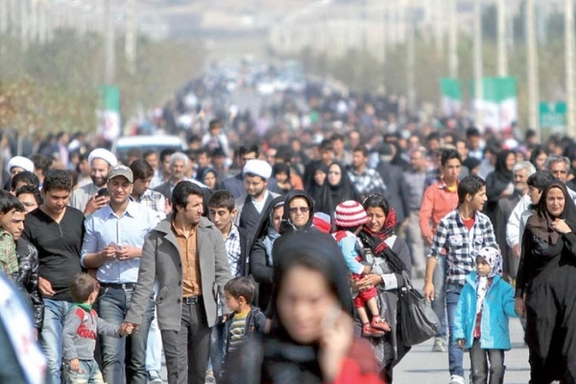
The US State Department, in a rare comment on Iran’s domestic financial policy, criticized a new law imposing capital gains taxes on real estate, vehicles, foreign currency, precious metals and cryptocurrencies, saying it would add to citizens’ hardships.
“By taxing the very assets people depend on for financial stability, the regime’s policies place an even greater burden on them,” it said in a statement posted on its Persian-language account on X Tuesday.
It said this decision "clearly demonstrates the regime’s disregard for the welfare of its citizens."
"Years of economic mismanagement and corruption have severely devalued Iran’s currency and forced many Iranians to rely on these assets as a hedge against inflation," the statement added.
The criticism comes as Iran introduced a new law making inflation partly taxable.
Iran’s President Masoud Pezeshkian formally signed the tax bill last month, after it was passed by parliament in late June.
The law targets capital gains on real estate, vehicles, gold, jewelry, silver, platinum, foreign currency and even cryptocurrencies. However, the law imposes tax not only on capital gains but also on half of the inflation-driven increases to asset prices.
Iran faces one of the highest inflation rates in the region. According to the International Monetary Fund's estimates, the annual inflation rate has averaged above 42% since 2020.
Since 2021, when the late-president Ebrahim Raisi took to power, the Iranian government’s tax revenues increased by over 300%.
Experts say inflation is one reason behind the increase in taxes, but argue that even after adjusting for inflation, the government should have raised taxation by at most 160%, not 326%.
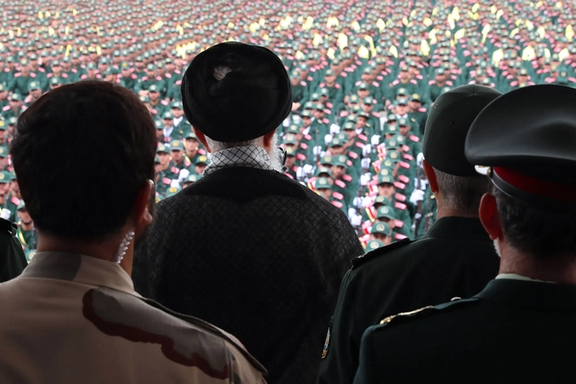
Facing a grinding crisis and mounting calls at home to change course before disaster strikes, Iran’s rulers still speak in a language that suggests they prefer the risks of war to the uncertainties of reform.
Supreme Leader Ali Khamenei on Sunday warned of an enemy plot to impose a harmful “no war, no peace” stalemate on Iran.
He alluded to the widespread fears of renewed conflict but stopped short of addressing them directly.
The “dangerous” limbo—as he called it—will be broken either by peace or by war. Yet peace would require a dramatic shift he has rejected in both word and deed, leaving only one option, even if not stated openly.
Why war seems manageable
For Tehran, war offers a chance to present itself as a power “standing firm against the enemy.”
That narrative rests on two premises: exaggerating the damage inflicted on Israel while recasting Iran’s own losses as “sacrifice” and “resilience.” This ability to redefine reality makes war appear containable, even when the battlefield balance tilts against Iran.
Conflict also strengthens institutions like the Revolutionary Guards and Basij, which dominate not only security but much of Iran’s economy and politics.
External crises bring them bigger budgets, wider powers, and a firmer grip on the state. Sustained tension, even without outright war, keeps them central to decision-making.
Bureaucratically, war simplifies governance.
An external threat sidelines factional disputes, concentrates power in one command center, and allows sensitive decisions to be postponed. In such conditions, obedience to central authority becomes the overriding principle.
Why change is riskier
Unlike war, which has a clear adversary and defined parameters, internal change is unpredictable.
The leadership knows genuine reform could set off a chain of fresh demands that quickly spiral out of control—especially when combined with external pressure. For a system built on concentrated power and tight social control, this is far riskier than conflict it believes it can at least spin through propaganda.
History reinforces this fear.
The Soviet collapse is interpreted in Tehran as the direct result of political liberalization. At home, the reform movement of the 1990s triggered demands that Khamenei deemed intolerable, ending in repression.
These experiences mean even cautious proposals—from economists or technocrats—are viewed as existential threats.
The IRGC and other power centers oppose change not only for security reasons but because their vast economic interests are at stake. Reform would mean redistribution of both power and wealth, making them natural adversaries of any shift.
A managed crisis—or a trap?
From Tehran’s perspective, war is “manageable”: it mobilizes security and propaganda, strengthens key institutions, and produces a narrative of defiance. Change, by contrast, has no clear enemy, no obvious tools of control, and no reliable endpoint.
Yet relying on crisis as a survival strategy carries its own risks.
Each confrontation further depletes Iran’s economic and social capacity. Emigration, a shrinking middle class, and crumbling infrastructure all show that the politics of permanent crisis may deliver short-term cohesion but erodes long-term survival.
The essential question is how long a state can balance on the edge of crisis before that very crisis slips out of control.
The answer is uncertain. What is clear is that the Islamic Republic still believes change, not war, is the greater danger to its survival.
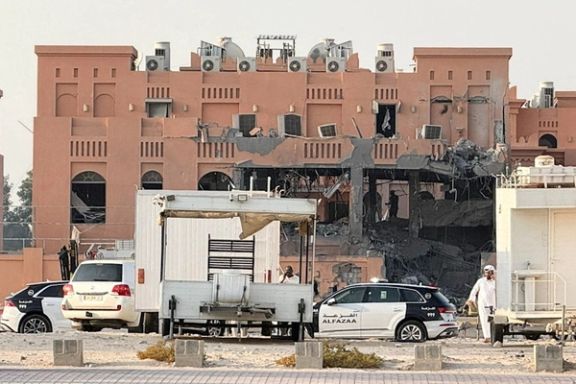
Iran on Tuesday condemned an Israeli attack on Hamas leaders in the Qatari capital Doha, calling the bombing of the Tehran-backed group's negotiating team a dangerous escalation to simmering Middle East tensions.
The Israeli military had earlier taken responsibility for the attack, saying it targeted what it called the "senior leadership of the Hamas terrorist organization" and that steps were taken to reduce civilian harm.
Iran's President Masoud Pezeshkian strongly condemned the attack as an "illegal, inhumane, and anti-peace action", saying it shows Israel "recognizes no limits to crime and terror, and destroys every attempt at diplomacy."
He called on the United Nations, the Organization of Islamic Cooperation, and other international bodies to respond to what he called a blatant aggression with immediate, decisive, and practical action.
"Attacking an independent country is a clear violation of national sovereignty and the UN Charter," Pezeshkian said, more than two months after Iran attacked a US base in Qatar during its 12-day war with Israel.
Iranian foreign ministry spokesman Esmaeil Baqaei also said "this action by the Israeli regime is a continuation of the crimes it has committed by violating all norms and international rules."
"This action is extremely dangerous and criminal; a blatant violation of all international laws and regulations, an infringement of Qatar’s national sovereignty and territorial integrity, and an attack on Palestinian negotiators."
Hamas has long based its political leadership in the gas-rich Persian Gulf state, which has traditionally served as a mediator in regional conflicts.
Khaled Qaddoumi, the Hamas representative in Iran, said the attack it described as an assassination attempt had failed and showed US perfidy.
“As always, the US government does not honor its commitments and consistently paves the way for the Israeli regime’s terrorist actions by creating the illusion of negotiations and offering superficial proposals," Qaddoumi was quoted as saying by Iranian state media.
"This time too, while the leadership of the movement was reviewing what was called the American plan in Doha, the occupying forces attacked the movement’s headquarters in a country that is one of the most important mediators, with US coordination.”
Hamas's ceasefire negotiation delegation survived Israeli attack, Reuters reported citing sources. There were no specific official comments on any casualties by Qatar or Hamas.
Negotiations to end the nearly two-year-old war in Gaza had been entering a critical new stage, with US President Donald Trump urging Israel and Hamas to agree to a prisoner exchange and ceasefire.
'Chieftains'
Speaking on X after the Doha attack, Israeli Prime Minister Benjamin Netanyahu appeared to stress there was no involvement by the United States, whose Mideast military hub is in Qatar.
"Today's action against the top terrorist chieftains of Hamas was a wholly independent Israeli operation," he said. "Israel initiated it, Israel conducted it, and Israel takes full responsibility."
Netanyahu on Monday visited the site of a deadly shooting by Palestinian gunmen on a bus in Jerusalem in which six people were killed, vowing to crush the Jewish state's enemies.
Iran and its regional affiliates have suffered multiple blows at the hands of its arch-foe in the regional conflagration which erupted since Hamas's October 7, 2023 attack on Israel.
A 12-day surprise Israeli campaign against Iran in June battered the Islamic Republic's military and nuclear infrastructure and killed hundreds of civilians and military personnel along with several top nuclear scientists.
32 Israelis were killed in Iranian counterattacks.
US attacks on three key Iranian nuclear sites capped off the war, and a retaliatory missile salvo caused damage deep inside a US airbase in Qatar, destroying a cutting-edge communications hub.
Iranian Supreme Leader Ali Khamenei this month sought Qatari mediation in talks with the West, multiple sources told Iran International, as Tehran signals rare flexibility on its enriched uranium as part of efforts to avert looming UN sanctions.
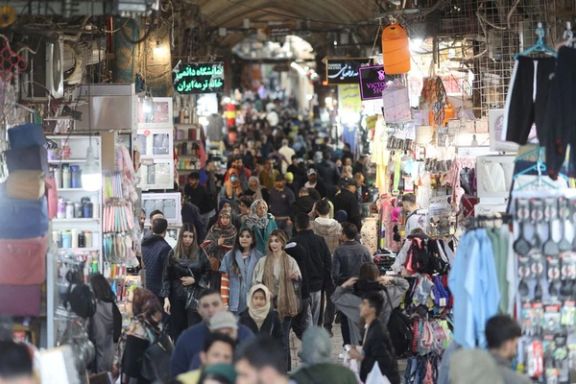
Iran has set up a suicide-prevention task force, the vice president for women and family affairs said on Monday, as the government prepares a national plan after rising cases among students and health workers.
Zahra Behrouzazar told an event at Iran University of Medical Sciences that a “Suicide Prevention Command Center” had been formed in Tehran province and would be expanded nationwide.
“Each of us is responsible for reducing suicide and our hope is that suicides will reach zero. This is an ambitious goal and requires a national program,” she said, according to state news agency IRNA. She described suicide as “a form of violence against oneself” and said prevention requires both “structural reforms and changes in mindset”.
Behrouzazar said Iran’s Social Emergency service -- a crisis intervention network run by the State Welfare Organization -- had been “65% effective” in its interventions and operates a 24-hour response in 378 cities.
“We cannot place all the burden on the Social Emergency; the supportive role of families matters,” she added.
Hassan Mousavi Chelek, the Welfare Organization’s deputy for social health, told the same conference the Social Emergency has worked on suicide prevention since 1999 and now runs fixed centers, mobile teams and the 123 hotline around the clock in 378 cities, IRNA reported.
He said interventions related to suicidal thoughts and attempts had increased fivefold between 2021 and 2024, which he said showed both need and growing public trust in the service.
Azarakhsh Mokri, a psychiatrist and associate professor at Tehran University of Medical Sciences, said social factors “more than medical illness” drive suicide risk, citing loneliness, unemployment and relationship breakdowns. He urged broader use of data and new technologies in prevention and cautioned against “over-medicalizing” suicide, IRNA reported.
The policy announcements come amid a spate of reported cases. Local rights outlet Haalvsh said on Monday that a farmer in Kahnuj, southeastern Iran, died by suicide at a local agriculture department office following alleged economic pressures, and that an internal-medicine specialist at Saravan’s Iranmehr Hospital was found dead in her dormitory after taking medication.
Also on Monday, a 26-year-old janitor who set himself on fire outside the governor’s office in Shadegan, southwestern Khuzestan province, died of his injuries, rights activists said.
In a separate report, a student collective said a female student died by suicide at Mohaghegh Ardabili University, calling for better campus support; the university has not issued an official statement.
Last year, a senior official at the prosecutor-general’s office said Iran records roughly 130,000 suicide attempts annually with about 7,000 deaths, and that suicide is the third-leading cause of death among people aged 15 to 24, according to reports from September 2024.
The official, Gholam-Abbas Torki, added that while Iran’s overall suicide mortality rate -- around 6.6 to 9.1 per 100,000 depending on the estimate -- is below the global average, it has been on an upward trend and requires scientific and coordinated prevention.
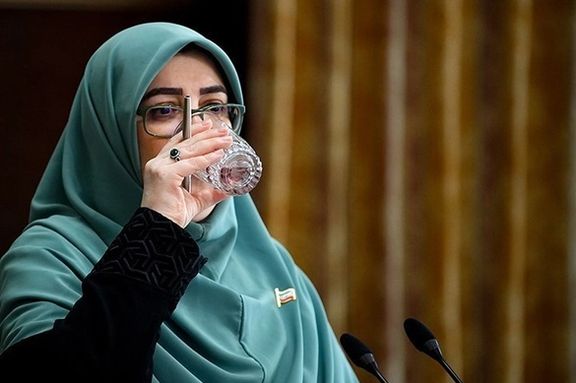
Iran’s government said on Tuesday it does not currently have access to its stockpiles of enriched uranium following June’s 12-day war that devastated the country’s nuclear facilities, as its foreign minister traveled to Egypt for talks with the UN nuclear watchdog.
Iran’s government said on Tuesday it does not currently have access to its stockpiles of enriched uranium following June’s 12-day war that devastated the country’s nuclear facilities, as its foreign minister traveled to Egypt for talks with the UN nuclear watchdog.
“In regard to uranium, we do not have access to it. It is in a location where access does not exist,” government spokeswoman Fatemeh Mohajerani told reporters at her weekly press briefing, without giving details of where the material is being held.
Her remarks came as Foreign Minister Abbas Araghchi arrived in Cairo for meetings with Egyptian officials and IAEA Director General Rafael Grossi. The talks are expected to focus on a new framework for nuclear inspections after Iran suspended cooperation with the agency in July.
Foreign ministry spokesman Esmail Baghaei confirmed late on Monday that “negotiations on the new protocol for Iran’s safeguards obligations will be finalized” during the Cairo meeting.
He said three rounds of technical talks had already produced a draft text that is now in its final stage.
Tasnim, citing an informed source on Tuesday, reported: “Today’s meeting between Abbas Araghchi and Rafael Grossi, the IAEA director general, is significant and will be held in Egypt within hours.”
The unnamed source added: “Although nothing has been finalized yet, a potential agreement between Iran and the Agency is possible.”
Voicing skepticism over progress in the Cairo talks, Laurence Norman, a correspondent for the Wall Street Journal, reported on Tuesday that he had learned “there is no agreement in place between Tehran and the agency, and the situation remains unclear.”
Mohajerani also referred to Iran’s complaint that IAEA inspectors had removed confidential documents from the Fordow enrichment site earlier this year.
“In early May, two documents accessed by inspectors were transferred to Vienna. After Iran submitted a written protest, the authorization of those two inspectors was revoked and their cooperation with Iran ended,” she said.
The government spokeswoman added that Iran’s future cooperation with the IAEA will be shaped by a law passed by parliament in June curbing the agency’s access, but stressed that any decision on leaving the Nuclear Non-Proliferation Treaty (NPT) “will ultimately be made by the system as a whole.”
On Monday, the watchdog's chief dismissed allegations that IAEA data had been misused to enable attacks on facilities, calling the allegation “an absurd narrative.” The agency, he said, had never shared confidential inspection information and was discussing additional measures to reassure Iran that safeguards data remained secure.
Rafael Grossi also told governors that Iran’s suspension of cooperation under a new domestic law cannot override its binding international commitments.
Several Iranian sources told Iran International that Supreme Leader Ali Khamenei instructed President Masoud Pezeshkian to seek mediation through the emir of Qatar to ease tensions with the West.
The diplomatic push comes as Britain, France, and Germany triggered the so-called “snapback” mechanism at the United Nations aimed at restoring all sanctions on Iran, citing Tehran’s refusal to meet Western demands over its nuclear and missile programs.
"I am pleased to report that Elizabeth Tsurkov, a Princeton Student, whose sister is an American Citizen, was just released by Kata’ib Hezbollah (MILITANT Hezbollah), and is now safely in the American Embassy in Iraq after being tortured for many months," Trump wrote on Truth Social, without elaborating.
"I will always fight for JUSTICE, and never give up. HAMAS, RELEASE THE HOSTAGES, NOW!"
Tsurkov, a PhD student at Princeton University in New Jersey and fellow at the New Lines Institute, disappeared in March 2023 while conducting research in Iraq.
Her sister Emma confirmed Tsurkov's release after 903 days in captivity and thanked the Trump administration.
No group among Iraq's kaleidoscope of armed militias had claimed responsibility for her disappearance. Israeli officials believed she was being held by Kata’ib Hezbollah, an Iran-backed Shi’ite militia.
While the group has denied involvement, an Iraqi official had told Israel’s Channel 11 that she was first detained by Iraq’s intelligence service—or by individuals impersonating officers—before being transferred to the militia.
Kata’ib Hezbollah is one of several Iran-backed and funded armed groups which took part in Iraq's conflict against Islamic State militants but amassed power and influence by maintaining their arms after the fighting largely winded down.
While no official comment was made on the case by Tehran, an Iraqi security source told Iran International that among those considered for the exchange was Mohammadreza Nouri, a member of Iran’s Islamic Revolutionary Guard Corps (IRGC) Quds Force.
Nouri was sentenced to life imprisonment in Iraq in September 2023 for orchestrating the murder of American citizen Stephen Troell in Baghdad in November 2022. It was not clear if he was ultimately released.
